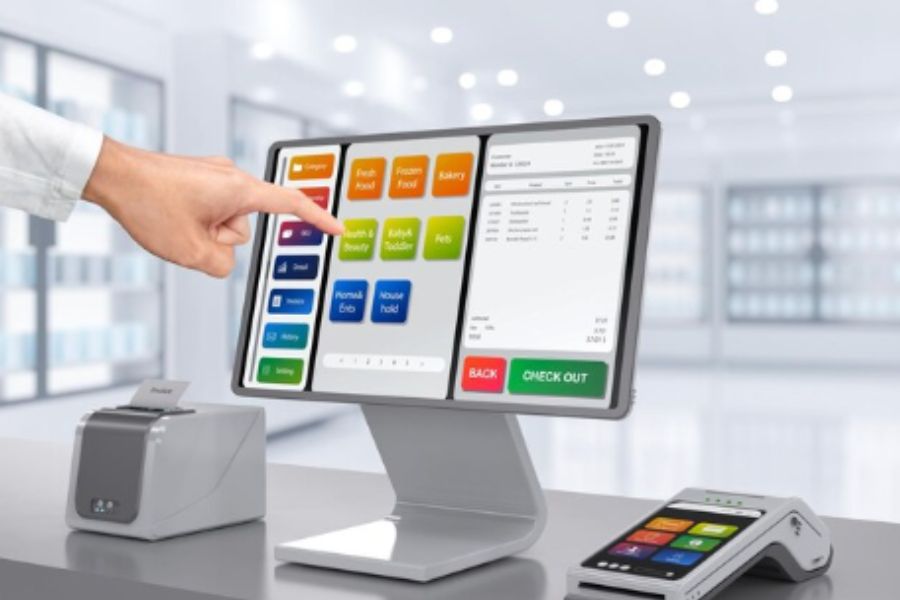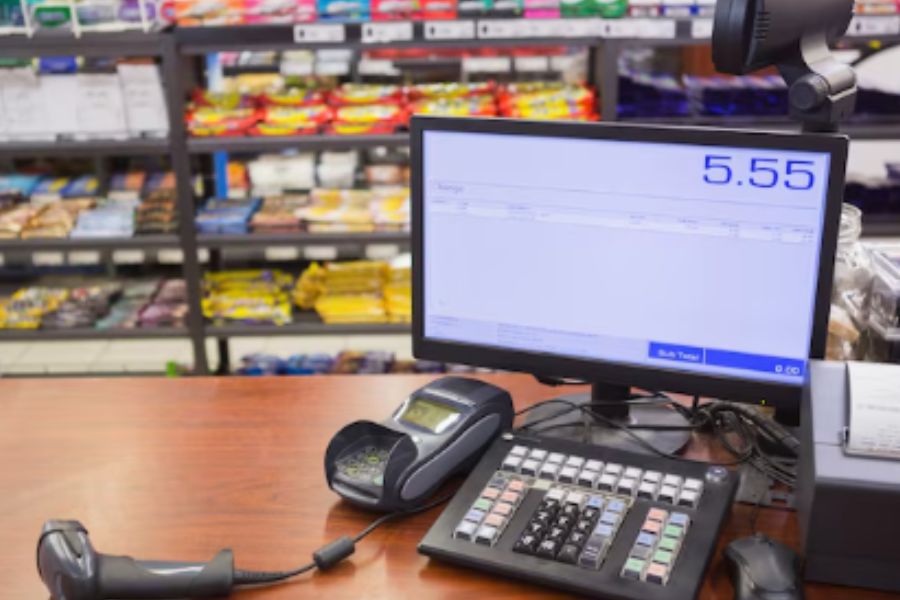In 2024, the landscape of point of sale for convenience stores is evolving rapidly. As technology advances, essential features become pivotal for seamless operations. This article delves into the crucial elements that define an effective POS system tailored for convenience stores. From sales reporting to inventory management, we explore the key components that will shape the retail experience in the coming years.
Definition of point of sale (POS) for convenience stores
The point of sale for convenience stores serves as the central hub where retail transactions are executed. In the context of convenience stores, the definition of a POS system extends beyond a mere transaction processing tool. It functions as a comprehensive solution tailored to the specific needs of these retail establishments. The application of POS for convenience stores goes beyond facilitating transactions; it becomes a pivotal element in enhancing operational efficiency and customer satisfaction.
Convenience store POS systems are designed to streamline various aspects of daily operations. From inventory management and sales reporting to customer relationship management (POS CRM) features, a well-implemented POS system contributes significantly to the overall success of a convenience store. By automating routine tasks such as tracking inventory levels, generating sales reports, and managing customer data, the POS system empowers store owners and staff to focus on providing excellent service and optimizing the customer experience.
The practicality of a POS system for convenience stores lies in its ability to integrate seamlessly with other business tools and technologies. This integration ensures a cohesive operation, reducing the likelihood of errors and enhancing overall productivity. Furthermore, the system’s intuitive interfaces and user-friendly features simplify the learning curve for store employees, allowing them to adapt quickly and perform their tasks more efficiently.
Significance of POS systems in 2024
The significance of POS systems in 2024 for convenience stores extends beyond basic transaction processing. It is a strategic investment that enhances operations, customer engagement, and overall business resilience. Embracing modern POS solutions ensures that convenience stores not only meet current consumer expectations but also POSition themselves for future success in an ever-evolving retail landscape:
- Adaptation to technological trends: The retail landscape is witnessing rapid technological advancements. POS systems in 2024 are equipped to adapt to emerging trends, such as online integration, mobile payments, and data security measures.
- Competitive edge: Businesses that invest in cutting-edge POS systems gain a competitive edge. Offering a seamless and tech-driven shopping experience attracts modern consumers and sets convenience stores apart in a crowded market.
- Operational resilience: POS systems provide operational resilience, minimizing downtime, and ensuring reliable performance. In a fast-paced environment like convenience stores, where every transaction counts, operational stability is crucial.
- Strategic decision-making: With sophisticated analytics and reporting tools, POS systems enable strategic decision-making. Store owners can identify top-performing products, optimize pricing strategies, and effectively manage inventory levels.
Essential features of point of sale for convenience stores
- Sales reporting for informed decision-making: Comprehensive sales reporting tools provide real-time insights into daily transactions, bestselling items, and overall revenue. Decision-makers can identify trends, adjust pricing strategies, and optimize product offerings based on data-driven analytics.
- Inventory management: Advanced inventory management streamlines stock control, automates reorder processes, and minimizes the risk of overstock or stockouts. Accurate tracking of product levels ensures that convenience stores can efficiently manage their supply chain and prevent revenue loss.
- Loyalty program integration for customer retention: Loyalty program integration fosters customer retention by rewarding repeat purchases. Personalized incentives, such as discounts or points-based systems, encourage customers to choose the convenience store for their regular needs.
- Self-checkout options for improved customer experience: Self-checkout kiosks enhance the overall shopping experience, reducing wait times and increasing customer satisfaction. User-friendly interfaces guide customers through the process, making transactions quick and convenient.
- Multi-store management for chains: Convenience store chains benefit from centralized management, allowing for consistent pricing, promotions, and inventory control across multiple locations. Streamlined operations and unified reporting facilitate efficient decision-making for the entire chain.
- Mobile POS capabilities for flexibility: Mobile point of sale for convenience stores enables staff to assist customers anywhere in the store, processing transactions on the spot. Increases operational flexibility and reduces checkout congestion during peak hours.
- Customizable touchscreen interface for tailored operations: Tailor the POS interface to match specific convenience store operations, ensuring a user-friendly and efficient checkout process. Customization options cater to the unique needs of each store, optimizing workflow and minimizing training time for staff.
- Integration with security cameras for enhanced security: Integration with security cameras enhances overall store security and loss prevention. Monitor transactions and enhance surveillance, deterring theft and ensuring a safe shopping environment.
- Customer relationship management (CRM) features: CRM features allow convenience stores to build and maintain customer relationships. Capture customer data, preferences, and purchase history to offer personalized promotions and improve overall satisfaction.
- Barcode scanning: Quick and accurate barcode scanning speeds up the checkout process. Reduces errors in pricing and inventory tracking, enhancing overall operational efficiency.
- Discount: Flexible discount options, including percentage-based or fixed discounts, cater to promotional strategies. Easily apply discounts to specific products or during specified timeframes.
- Receipt: Customizable receipt formats with store branding and transaction details. Enhances professionalism and provides customers with clear purchase information.
- Online ordering and delivery integration: Integration with online platforms facilitates convenient ordering and delivery services. Expand the store’s reach and meet the growing demand for online shopping and delivery.
- 24/7 customer support for reliable operations: Access to round-the-clock customer support ensures quick issue resolution. Minimizes downtime and contributes to the reliable and continuous operation of the convenience store.
Considerations when choosing a convenience store POS system
Store size and scale
Selecting the right point of sale for convenience stores involves thoughtful consideration of various factors. One critical aspect is the store’s size and scale, as this directly influences the type of POS system that best suits the business:
- Small convenience stores: For smaller stores with limited floor space and inventory, a compact and user-friendly POS system is essential. Cloud-based POS solutions are often suitable, providing flexibility and accessibility without the need for extensive hardware.
- Medium-sized convenience stores: Medium-sized stores may benefit from more advanced POS systems with robust inventory management features. Integration capabilities become crucial to streamlining operations and maintaining accurate stock levels across departments.
- A large chain of convenience stores: Chains with multiple locations require a POS system that supports centralized management. Enterprise-level solutions provide a unified platform, enabling consistent pricing, promotions, and reporting across all stores.
- Scalability: Consider a POS system that can grow with the business. Scalability is vital, especially for expanding convenience store chains. The system should seamlessly accommodate the addition of new features, locations, and increased transaction volumes.
- Customization for unique needs: Each convenience store has unique requirements based on its offerings and target market. Look for a POS system that allows customization to meet specific needs, whether related to product categories, promotions, or reporting.
Specific industry regulations
Selecting the right point of sale (POS) system for a convenience store involves careful consideration of specific industry regulations. Compliance with these regulations is crucial for the seamless operation of the store and to avoid legal complications. Here are key considerations related to industry regulations:
- Age verification and regulatory compliance: Ensure that the POS system has robust age verification features, especially if the convenience store sells age-restricted products such as tobacco or alcohol. Compliance with local and federal age restrictions is critical to avoid legal penalties.
- Health and safety compliance: Check if the POS system adheres to health and safety regulations, particularly important for stores handling perishable goods or prepared food items. Features like temperature monitoring and expiry date tracking contribute to compliance in this regard.
- Taxation regulations: Convenience stores often deal with various tax rates on different products. The POS system should support automated tax calculations based on the store’s location and the types of products sold. Compliance with tax regulations minimizes the risk of financial discrepancies and ensures accurate reporting.
- Payment card industry data security standard (PCI DSS) compliance: Security is paramount, especially when handling customer payment information. Choose a POS system that adheres to PCI DSS standards. Secure payment processing protects customer data, instills trust, and mitigates the risk of financial fraud.
- Employee management regulations: If the convenience store operates in regions with specific labor regulations, the POS system should support features like time tracking and payroll management. Compliance with labor laws contributes to fair employment practices and avoids legal complications.
Budgetary considerations
The aspects related to budget that convenience store owners should weigh when choosing a POS system:
- Initial investment: Evaluate the upfront costs associated with implementing the POS system. This includes hardware, software licenses, and installation expenses. Consider whether the initial investment aligns with the budget constraints while ensuring the system meets the store’s operational needs.
- Subscription or licensing fees: POS systems often come with subscription fees or licensing costs. Understand the pricing structure, whether it’s a one-time purchase or a recurring expense. Factor in ongoing costs to ensure the chosen POS system remains financially viable in the long run.
- Scalability: Choose a POS system that can scale with the growth of the convenience store. Consider systems that allow you to add features or expand capabilities without significant additional costs. Scalability ensures that the initial investment continues to provide value as the business evolves.
- Maintenance and support costs: Assess the maintenance and support costs associated with the POS system. This includes software updates, technical support, and potential training expenses. Ensure that ongoing support is accessible and aligns with the budget constraints of the convenience store.
- Transaction fees: Some POS systems may charge transaction fees, particularly for payment processing. Understand the fee structure and calculate how it may impact overall operational costs. Compare transaction fees among different POS providers to choose an option that optimally aligns with the store’s transaction volume.
Integration capabilities
The seamless integration of a POS system with other essential tools and platforms significantly impacts the efficiency and success of the business. Here are crucial aspects to consider regarding integration capabilities:
- Inventory integration: Ensure the POS system integrates seamlessly with inventory management tools. This synchronization streamlines stock control, prevents overstock or stockouts, and facilitates real-time tracking.
- Accounting software compatibility: Integration with accounting software simplifies financial processes. Look for a POS system that easily syncs with accounting tools, automating tasks such as bookkeeping and tax reporting.
- E-commerce platforms: For convenience stores with an online presence, integration with e-commerce platforms is essential. This ensures a unified approach to managing both physical and online sales channels.
- Payment processing systems: Compatibility with various payment methods and processors is crucial. A POS system should seamlessly integrate with payment gateways, ensuring smooth and secure transactions for both customers and the business.
- Customer relationship management (CRM): Integration with CRM tools enables the collection and analysis of customer data. This enhances personalized marketing efforts, loyalty programs, and overall customer satisfaction.
- Marketing and loyalty programs: Integration with marketing tools and loyalty program platforms enhances promotional activities. This includes targeted marketing campaigns, discounts, and rewards programs to engage and retain customers.
- Security systems integration: POS systems should integrate with existing security systems, including surveillance cameras and access control. This comprehensive integration enhances loss prevention and ensures a secure shopping environment.
- Employee management software: Streamline human resource processes by choosing a POS system that integrates with employee management software. This includes features like time tracking, payroll integration, and performance analytics.
Customer support
When selecting a point of sale for convenience stores, the quality of customer support should be a critical factor in your decision-making process. Exceptional customer support ensures that your business operates smoothly and any issues are addressed promptly. Key considerations regarding customer support for choosing a convenience store POS system:
- Operational continuity: 24/7 support availability is crucial to address urgent issues promptly. With 24/7 customer support, the POS solution ConnectPOS ensures that your convenience store experiences minimal downtime. Quick issue resolution contributes to uninterrupted operations, providing peace of mind to both store owners and staff.
- Adaptability to user needs: Every convenience store has unique requirements. ConnectPOS understands this and adapts its customer support to address individual needs. Whether you’re a single-store operator or managing a chain, the support team at ConnectPOS tailors assistance to suit your specific circumstances.
- Integration assistance: When integrating the POS system with other tools or software, check if the customer support team assists. Seamless integration contributes to a more cohesive and efficient business operation.
- Multi-channel support: This multi-channel approach ensures that you can reach out for assistance using the method most convenient for you, fostering a seamless and efficient communication process.
- Training and onboarding: Transitioning to a new POS system requires adequate training and onboarding. ConnectPOS not only provides comprehensive training sessions but also offers ongoing support to ensure that your staff is confident and proficient in using the system.
Conclusion
Staying ahead in the competitive realm of convenience stores requires embracing cutting-edge POS solutions. The essential features highlighted herein are the building blocks of a successful retail operation in 2024. For a deeper understanding or any inquiries, feel free to contact us. Empower your business with the right point of sale for convenience stores and propel toward a future of efficient and customer-centric business management.



